CSU: Literature Review - Smart Home Healthcare System for Dementia
VerifiedAdded on 2024/07/01
|115
|10054
|65
Literature Review
AI Summary
This literature review examines the concept of smart home healthcare systems for monitoring the health of elderly patients suffering from dementia, drawing upon five journal papers. It explores various aspects of health monitoring systems, including the technologies used, such as environmental sensors, personal sensor networks, and body sensor networks, and their application in managing conditions like fall detection and memory loss. The review also delves into the importance of human factors in mental health care, particularly in community-based programs for older adults with depression and dementia, highlighting the Aging Brain Care Model and its components. Additionally, it investigates cloud-based smart home environments for delivering home healthcare, focusing on activity recognition and health problem detection. The studies included discuss the benefits, limitations, and future work related to these systems, including the need for improved computational power, data sharing practices, and personalized care approaches.
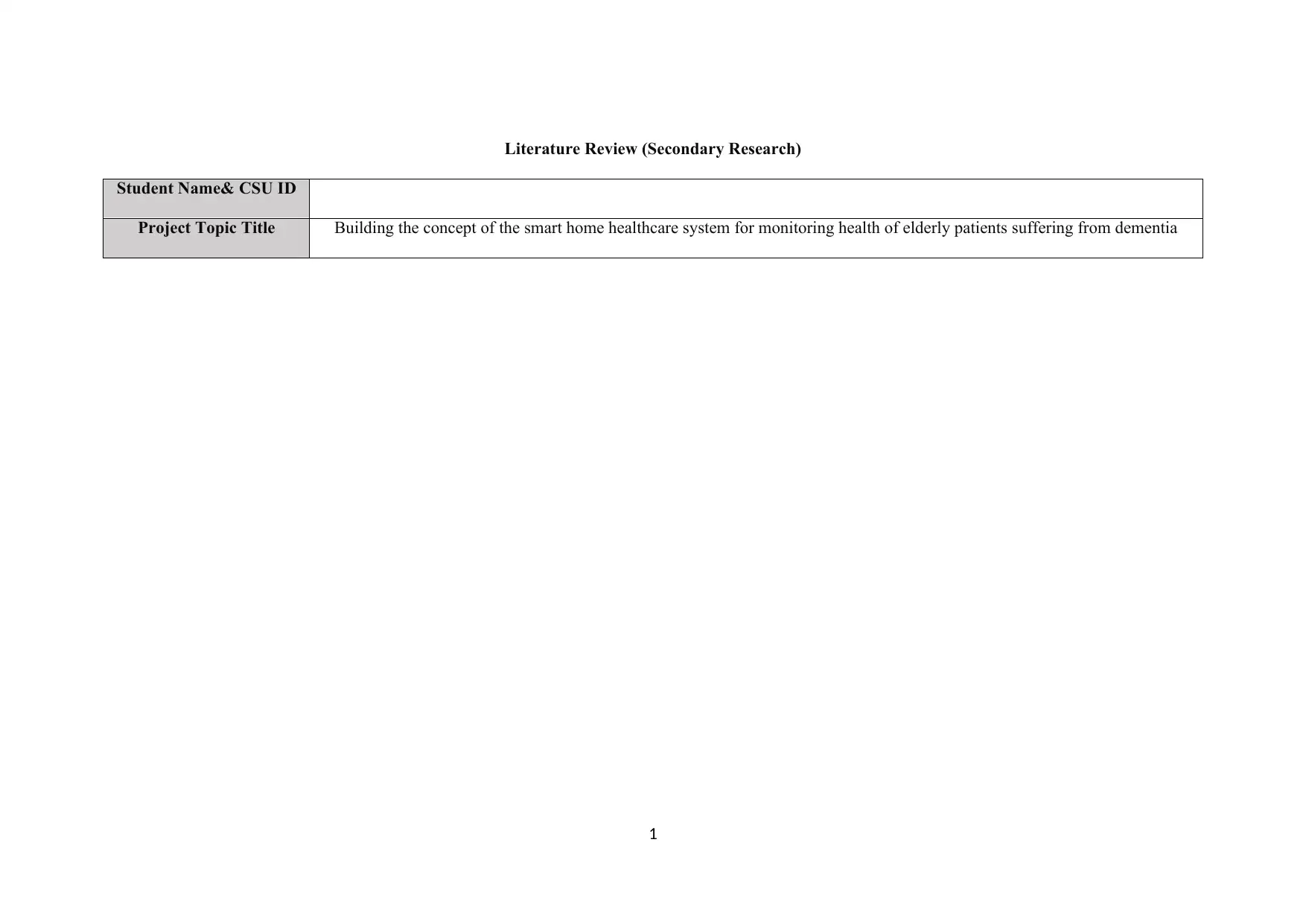
Literature Review (Secondary Research)
Student Name& CSU ID
Project Topic Title Building the concept of the smart home healthcare system for monitoring health of elderly patients suffering from dementia
1
Student Name& CSU ID
Project Topic Title Building the concept of the smart home healthcare system for monitoring health of elderly patients suffering from dementia
1
Paraphrase This Document
Need a fresh take? Get an instant paraphrase of this document with our AI Paraphraser
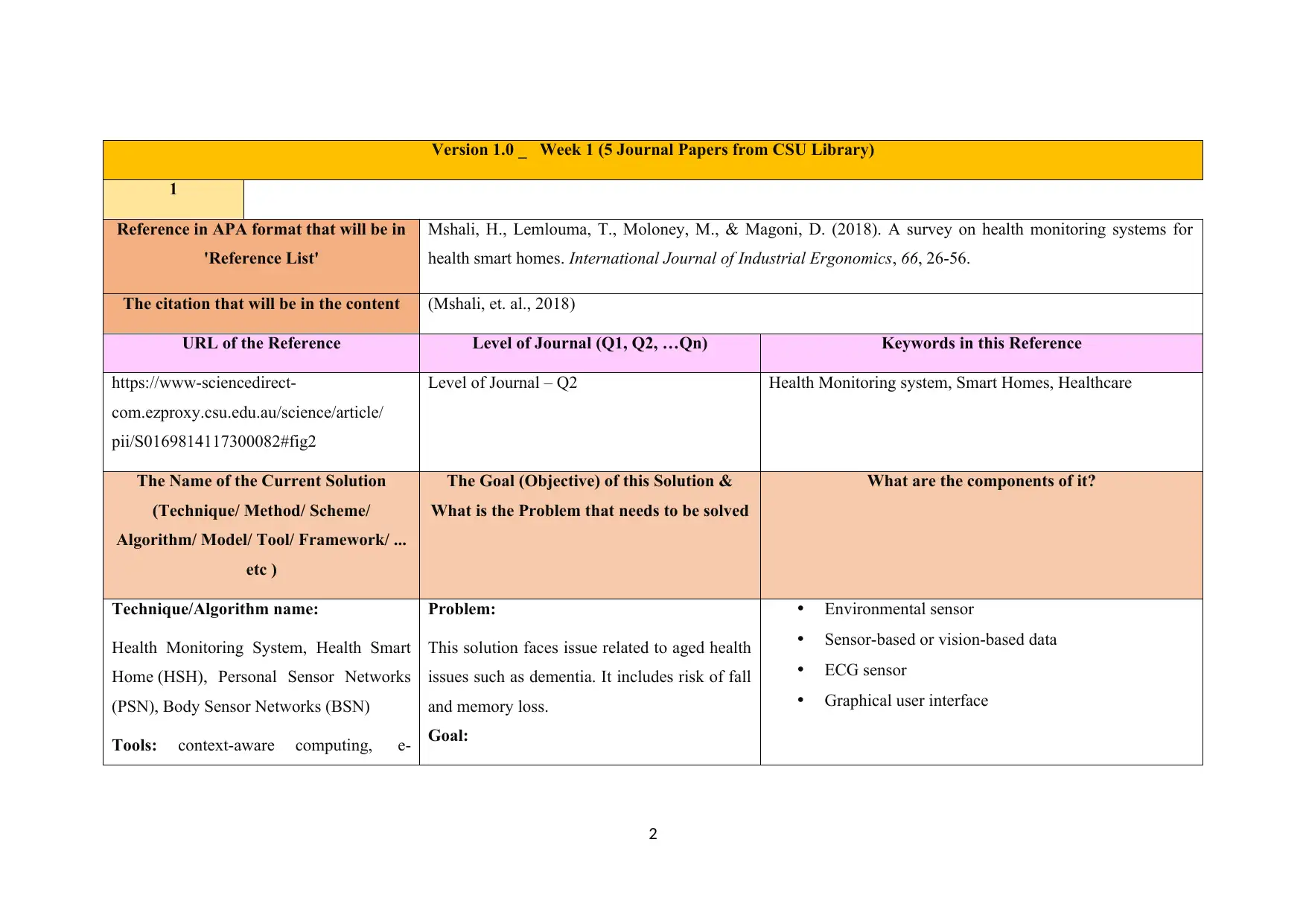
Version 1.0 _ Week 1 (5 Journal Papers from CSU Library)
1
Reference in APA format that will be in
'Reference List'
Mshali, H., Lemlouma, T., Moloney, M., & Magoni, D. (2018). A survey on health monitoring systems for
health smart homes. International Journal of Industrial Ergonomics, 66, 26-56.
The citation that will be in the content (Mshali, et. al., 2018)
URL of the Reference Level of Journal (Q1, Q2, …Qn) Keywords in this Reference
https://www-sciencedirect-
com.ezproxy.csu.edu.au/science/article/
pii/S0169814117300082#fig2
Level of Journal – Q2 Health Monitoring system, Smart Homes, Healthcare
The Name of the Current Solution
(Technique/ Method/ Scheme/
Algorithm/ Model/ Tool/ Framework/ ...
etc )
The Goal (Objective) of this Solution &
What is the Problem that needs to be solved
What are the components of it?
Technique/Algorithm name:
Health Monitoring System, Health Smart
Home (HSH), Personal Sensor Networks
(PSN), Body Sensor Networks (BSN)
Tools: context-aware computing, e-
Problem:
This solution faces issue related to aged health
issues such as dementia. It includes risk of fall
and memory loss.
Goal:
Environmental sensor
Sensor-based or vision-based data
ECG sensor
Graphical user interface
2
1
Reference in APA format that will be in
'Reference List'
Mshali, H., Lemlouma, T., Moloney, M., & Magoni, D. (2018). A survey on health monitoring systems for
health smart homes. International Journal of Industrial Ergonomics, 66, 26-56.
The citation that will be in the content (Mshali, et. al., 2018)
URL of the Reference Level of Journal (Q1, Q2, …Qn) Keywords in this Reference
https://www-sciencedirect-
com.ezproxy.csu.edu.au/science/article/
pii/S0169814117300082#fig2
Level of Journal – Q2 Health Monitoring system, Smart Homes, Healthcare
The Name of the Current Solution
(Technique/ Method/ Scheme/
Algorithm/ Model/ Tool/ Framework/ ...
etc )
The Goal (Objective) of this Solution &
What is the Problem that needs to be solved
What are the components of it?
Technique/Algorithm name:
Health Monitoring System, Health Smart
Home (HSH), Personal Sensor Networks
(PSN), Body Sensor Networks (BSN)
Tools: context-aware computing, e-
Problem:
This solution faces issue related to aged health
issues such as dementia. It includes risk of fall
and memory loss.
Goal:
Environmental sensor
Sensor-based or vision-based data
ECG sensor
Graphical user interface
2
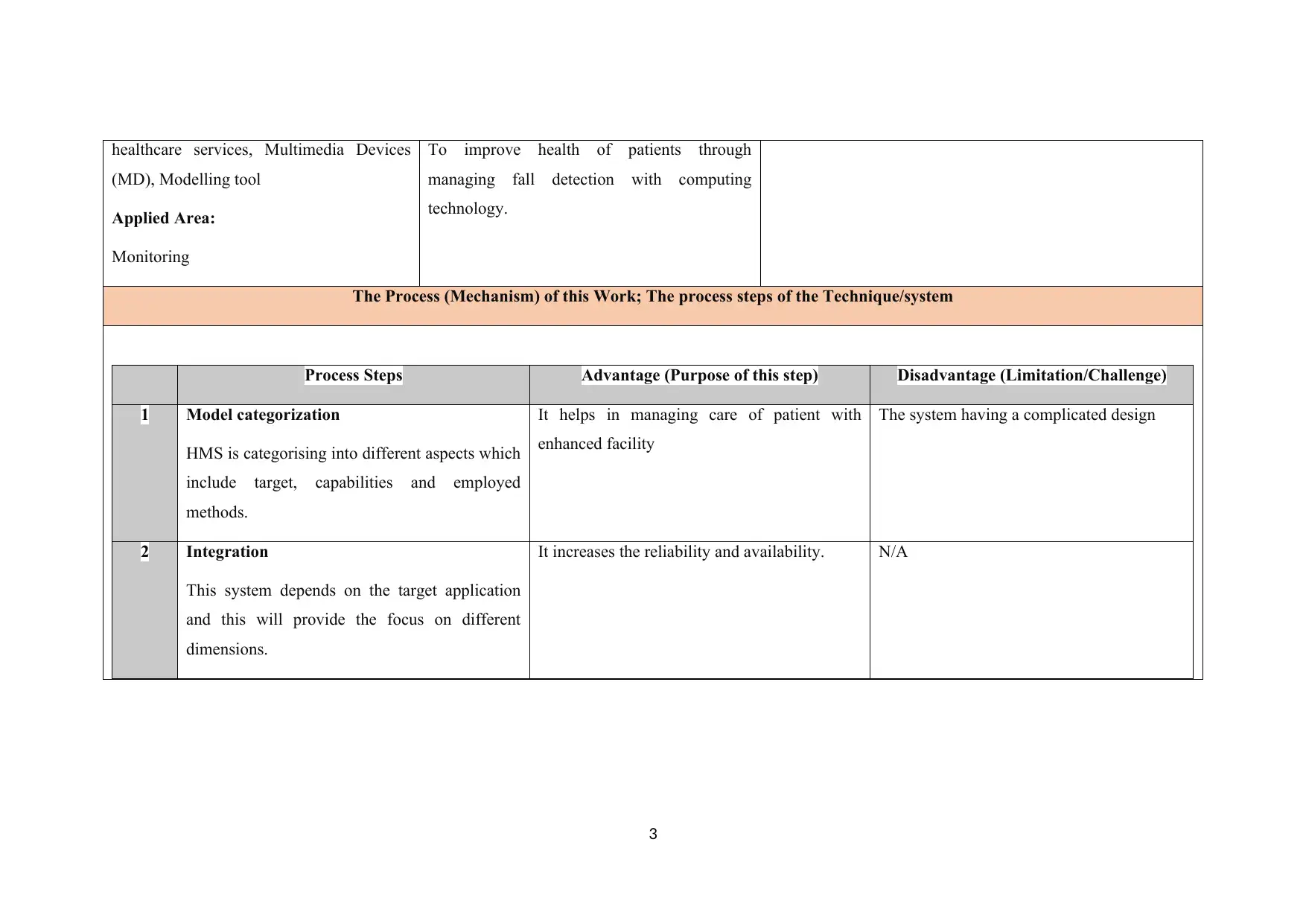
healthcare services, Multimedia Devices
(MD), Modelling tool
Applied Area:
Monitoring
To improve health of patients through
managing fall detection with computing
technology.
The Process (Mechanism) of this Work; The process steps of the Technique/system
Process Steps Advantage (Purpose of this step) Disadvantage (Limitation/Challenge)
1 Model categorization
HMS is categorising into different aspects which
include target, capabilities and employed
methods.
It helps in managing care of patient with
enhanced facility
The system having a complicated design
2 Integration
This system depends on the target application
and this will provide the focus on different
dimensions.
It increases the reliability and availability. N/A
3
(MD), Modelling tool
Applied Area:
Monitoring
To improve health of patients through
managing fall detection with computing
technology.
The Process (Mechanism) of this Work; The process steps of the Technique/system
Process Steps Advantage (Purpose of this step) Disadvantage (Limitation/Challenge)
1 Model categorization
HMS is categorising into different aspects which
include target, capabilities and employed
methods.
It helps in managing care of patient with
enhanced facility
The system having a complicated design
2 Integration
This system depends on the target application
and this will provide the focus on different
dimensions.
It increases the reliability and availability. N/A
3
⊘ This is a preview!⊘
Do you want full access?
Subscribe today to unlock all pages.

Trusted by 1+ million students worldwide
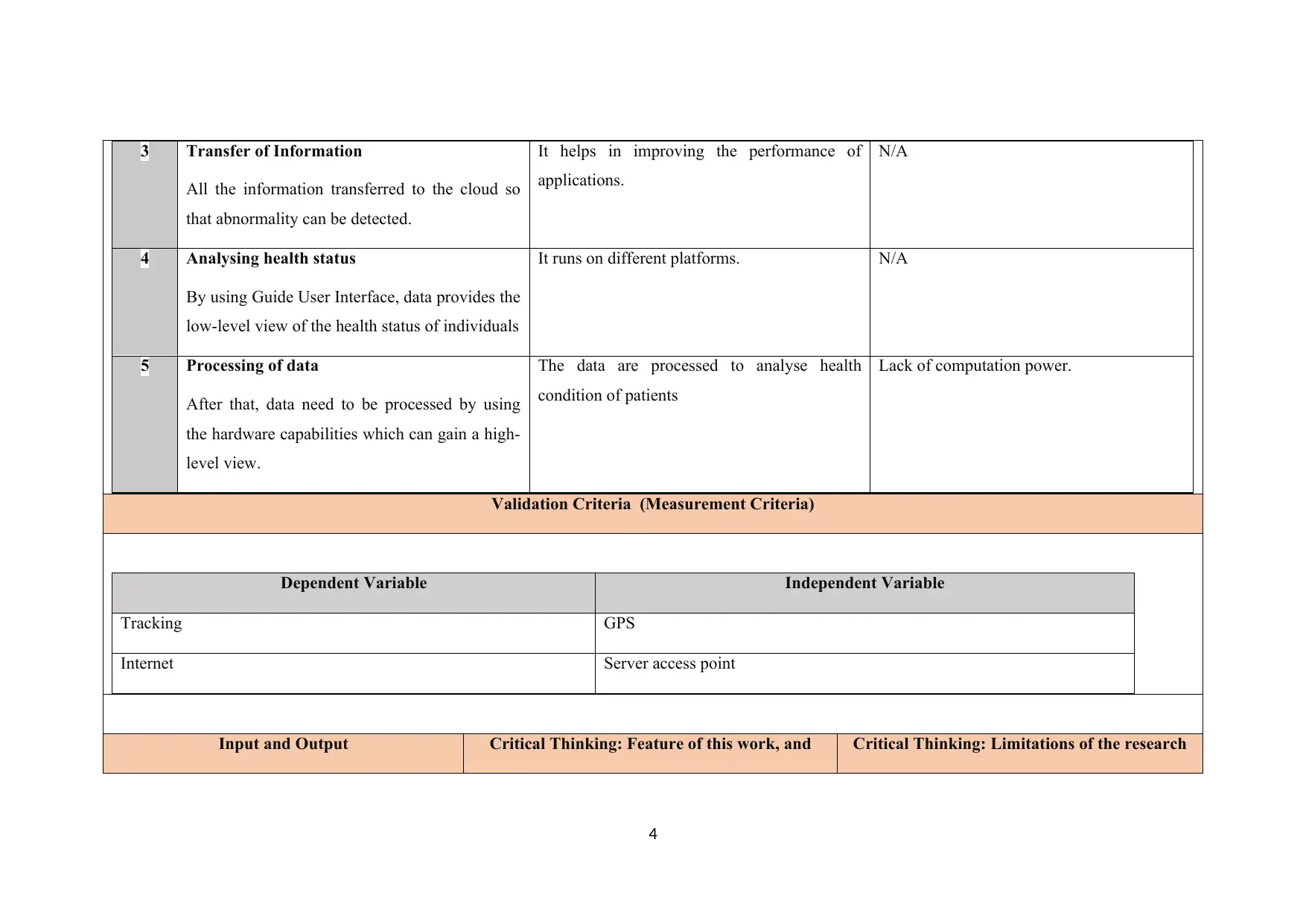
3 Transfer of Information
All the information transferred to the cloud so
that abnormality can be detected.
It helps in improving the performance of
applications.
N/A
4 Analysing health status
By using Guide User Interface, data provides the
low-level view of the health status of individuals
It runs on different platforms. N/A
5 Processing of data
After that, data need to be processed by using
the hardware capabilities which can gain a high-
level view.
The data are processed to analyse health
condition of patients
Lack of computation power.
Validation Criteria (Measurement Criteria)
Dependent Variable Independent Variable
Tracking GPS
Internet Server access point
Input and Output Critical Thinking: Feature of this work, and Critical Thinking: Limitations of the research
4
All the information transferred to the cloud so
that abnormality can be detected.
It helps in improving the performance of
applications.
N/A
4 Analysing health status
By using Guide User Interface, data provides the
low-level view of the health status of individuals
It runs on different platforms. N/A
5 Processing of data
After that, data need to be processed by using
the hardware capabilities which can gain a high-
level view.
The data are processed to analyse health
condition of patients
Lack of computation power.
Validation Criteria (Measurement Criteria)
Dependent Variable Independent Variable
Tracking GPS
Internet Server access point
Input and Output Critical Thinking: Feature of this work, and Critical Thinking: Limitations of the research
4
Paraphrase This Document
Need a fresh take? Get an instant paraphrase of this document with our AI Paraphraser
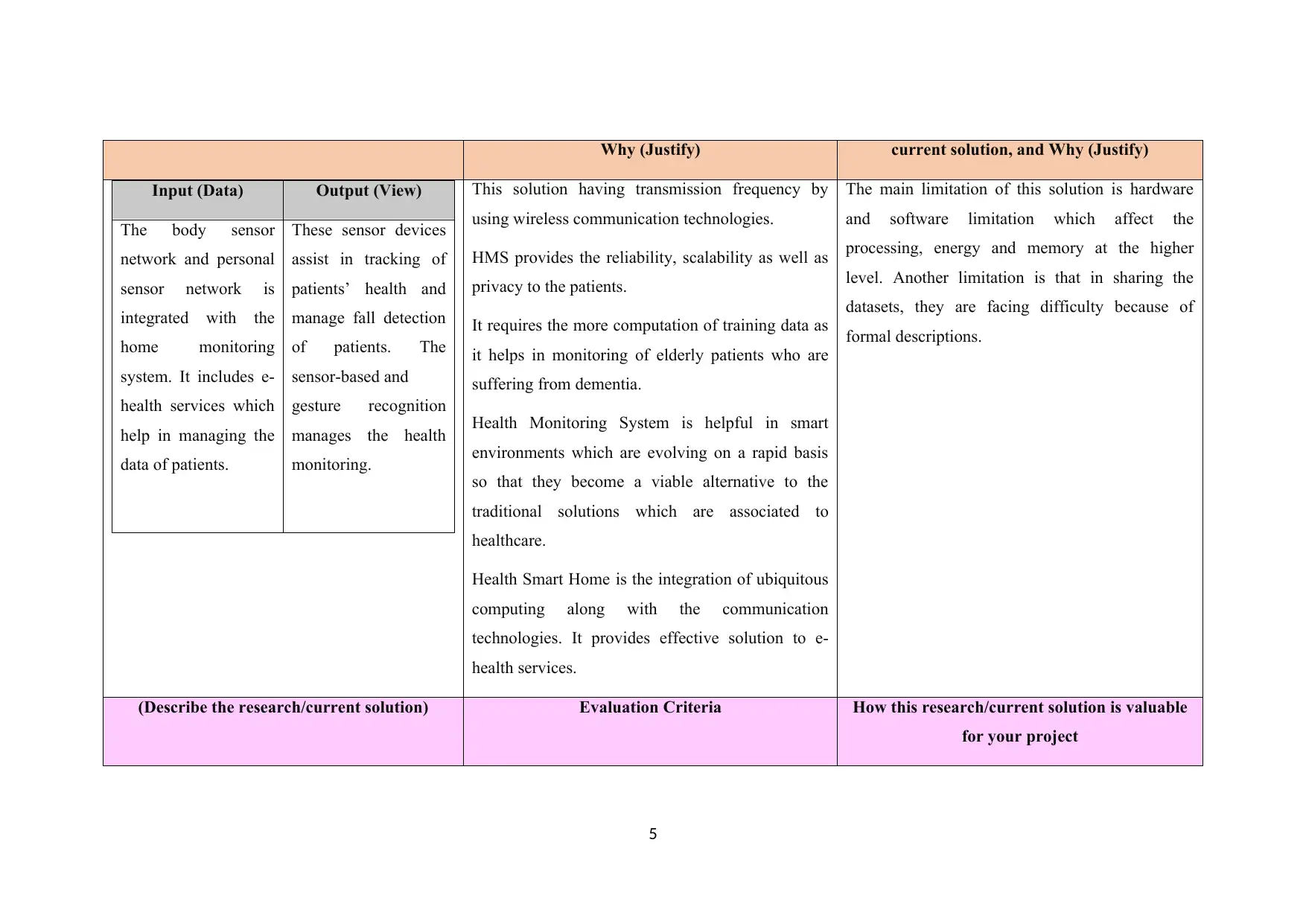
Why (Justify) current solution, and Why (Justify)
Input (Data) Output (View)
The body sensor
network and personal
sensor network is
integrated with the
home monitoring
system. It includes e-
health services which
help in managing the
data of patients.
These sensor devices
assist in tracking of
patients’ health and
manage fall detection
of patients. The
sensor-based and
gesture recognition
manages the health
monitoring.
This solution having transmission frequency by
using wireless communication technologies.
HMS provides the reliability, scalability as well as
privacy to the patients.
It requires the more computation of training data as
it helps in monitoring of elderly patients who are
suffering from dementia.
Health Monitoring System is helpful in smart
environments which are evolving on a rapid basis
so that they become a viable alternative to the
traditional solutions which are associated to
healthcare.
Health Smart Home is the integration of ubiquitous
computing along with the communication
technologies. It provides effective solution to e-
health services.
The main limitation of this solution is hardware
and software limitation which affect the
processing, energy and memory at the higher
level. Another limitation is that in sharing the
datasets, they are facing difficulty because of
formal descriptions.
(Describe the research/current solution) Evaluation Criteria How this research/current solution is valuable
for your project
5
Input (Data) Output (View)
The body sensor
network and personal
sensor network is
integrated with the
home monitoring
system. It includes e-
health services which
help in managing the
data of patients.
These sensor devices
assist in tracking of
patients’ health and
manage fall detection
of patients. The
sensor-based and
gesture recognition
manages the health
monitoring.
This solution having transmission frequency by
using wireless communication technologies.
HMS provides the reliability, scalability as well as
privacy to the patients.
It requires the more computation of training data as
it helps in monitoring of elderly patients who are
suffering from dementia.
Health Monitoring System is helpful in smart
environments which are evolving on a rapid basis
so that they become a viable alternative to the
traditional solutions which are associated to
healthcare.
Health Smart Home is the integration of ubiquitous
computing along with the communication
technologies. It provides effective solution to e-
health services.
The main limitation of this solution is hardware
and software limitation which affect the
processing, energy and memory at the higher
level. Another limitation is that in sharing the
datasets, they are facing difficulty because of
formal descriptions.
(Describe the research/current solution) Evaluation Criteria How this research/current solution is valuable
for your project
5
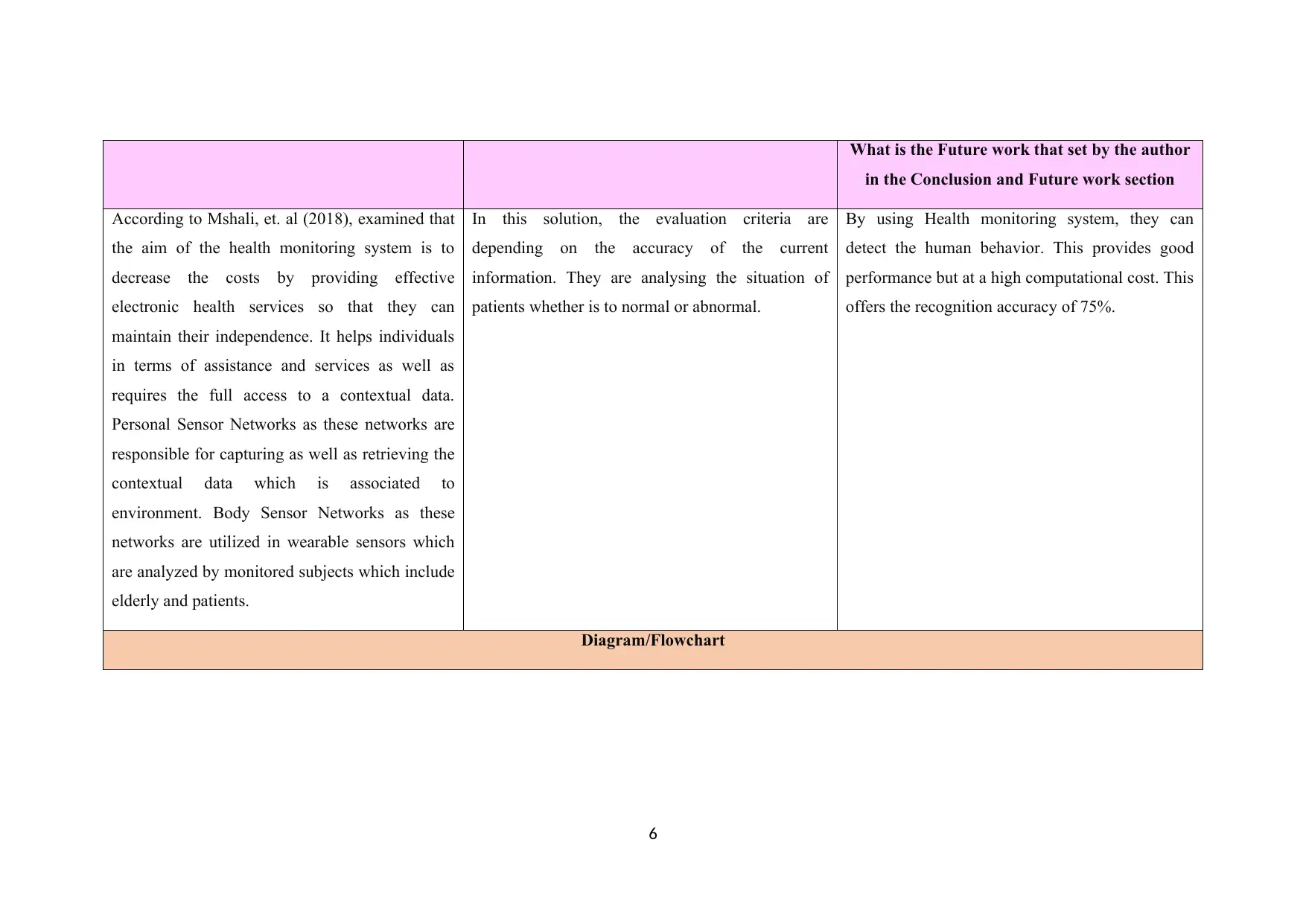
What is the Future work that set by the author
in the Conclusion and Future work section
According to Mshali, et. al (2018), examined that
the aim of the health monitoring system is to
decrease the costs by providing effective
electronic health services so that they can
maintain their independence. It helps individuals
in terms of assistance and services as well as
requires the full access to a contextual data.
Personal Sensor Networks as these networks are
responsible for capturing as well as retrieving the
contextual data which is associated to
environment. Body Sensor Networks as these
networks are utilized in wearable sensors which
are analyzed by monitored subjects which include
elderly and patients.
In this solution, the evaluation criteria are
depending on the accuracy of the current
information. They are analysing the situation of
patients whether is to normal or abnormal.
By using Health monitoring system, they can
detect the human behavior. This provides good
performance but at a high computational cost. This
offers the recognition accuracy of 75%.
Diagram/Flowchart
6
in the Conclusion and Future work section
According to Mshali, et. al (2018), examined that
the aim of the health monitoring system is to
decrease the costs by providing effective
electronic health services so that they can
maintain their independence. It helps individuals
in terms of assistance and services as well as
requires the full access to a contextual data.
Personal Sensor Networks as these networks are
responsible for capturing as well as retrieving the
contextual data which is associated to
environment. Body Sensor Networks as these
networks are utilized in wearable sensors which
are analyzed by monitored subjects which include
elderly and patients.
In this solution, the evaluation criteria are
depending on the accuracy of the current
information. They are analysing the situation of
patients whether is to normal or abnormal.
By using Health monitoring system, they can
detect the human behavior. This provides good
performance but at a high computational cost. This
offers the recognition accuracy of 75%.
Diagram/Flowchart
6
⊘ This is a preview!⊘
Do you want full access?
Subscribe today to unlock all pages.

Trusted by 1+ million students worldwide
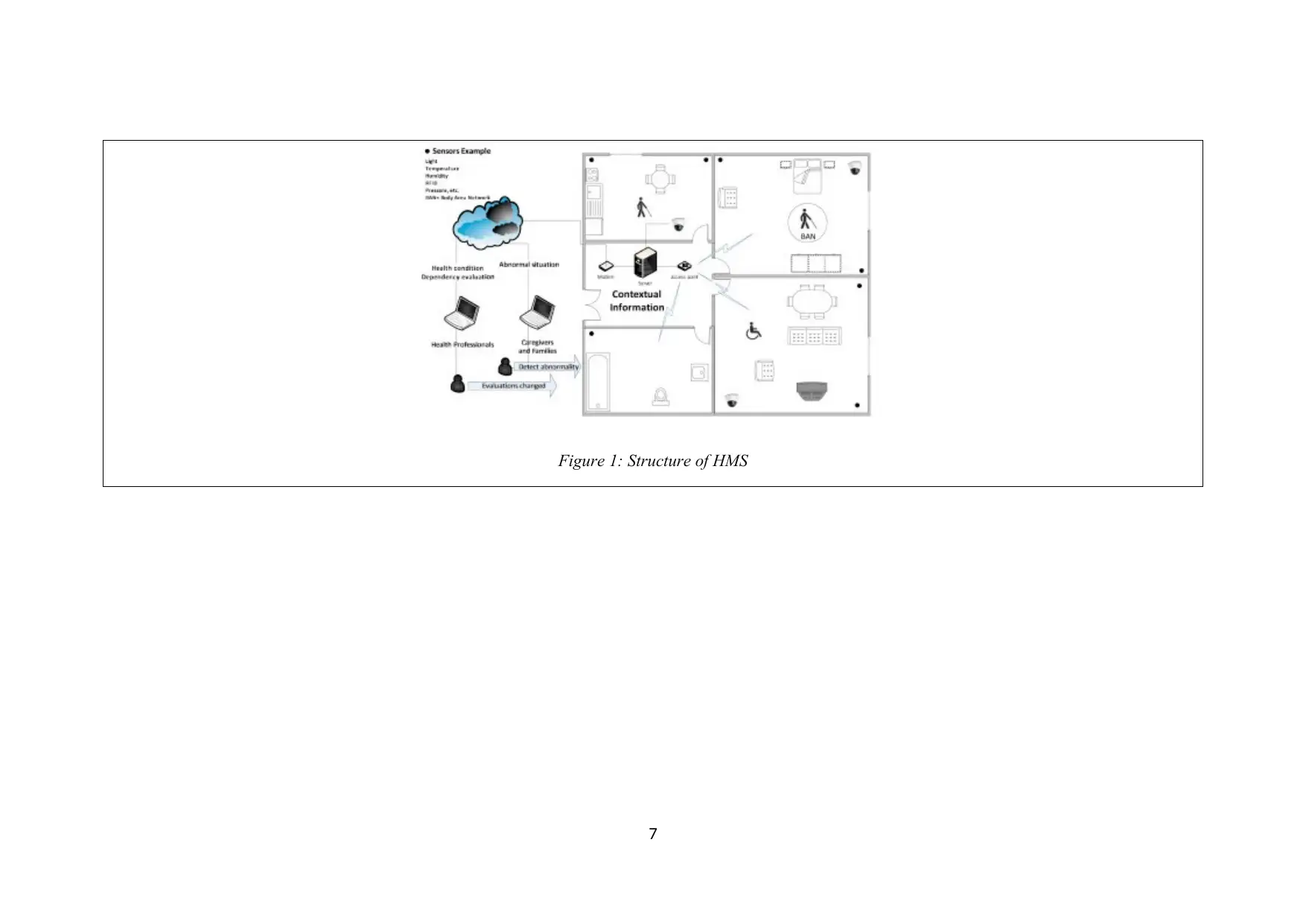
Figure 1: Structure of HMS
7
7
Paraphrase This Document
Need a fresh take? Get an instant paraphrase of this document with our AI Paraphraser
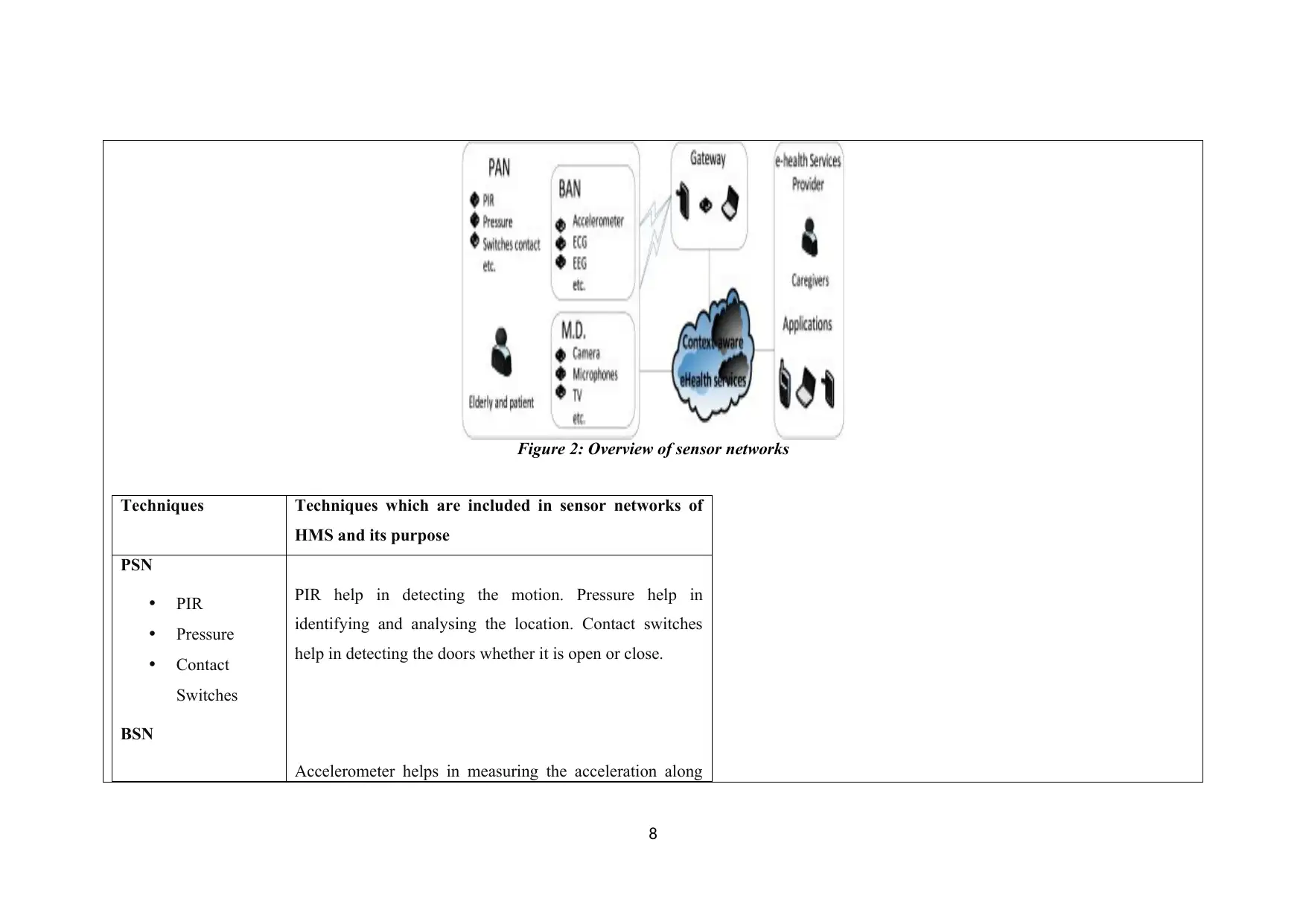
Figure 2: Overview of sensor networks
Techniques Techniques which are included in sensor networks of
HMS and its purpose
PSN
PIR
Pressure
Contact
Switches
BSN
PIR help in detecting the motion. Pressure help in
identifying and analysing the location. Contact switches
help in detecting the doors whether it is open or close.
Accelerometer helps in measuring the acceleration along
8
Techniques Techniques which are included in sensor networks of
HMS and its purpose
PSN
PIR
Pressure
Contact
Switches
BSN
PIR help in detecting the motion. Pressure help in
identifying and analysing the location. Contact switches
help in detecting the doors whether it is open or close.
Accelerometer helps in measuring the acceleration along
8
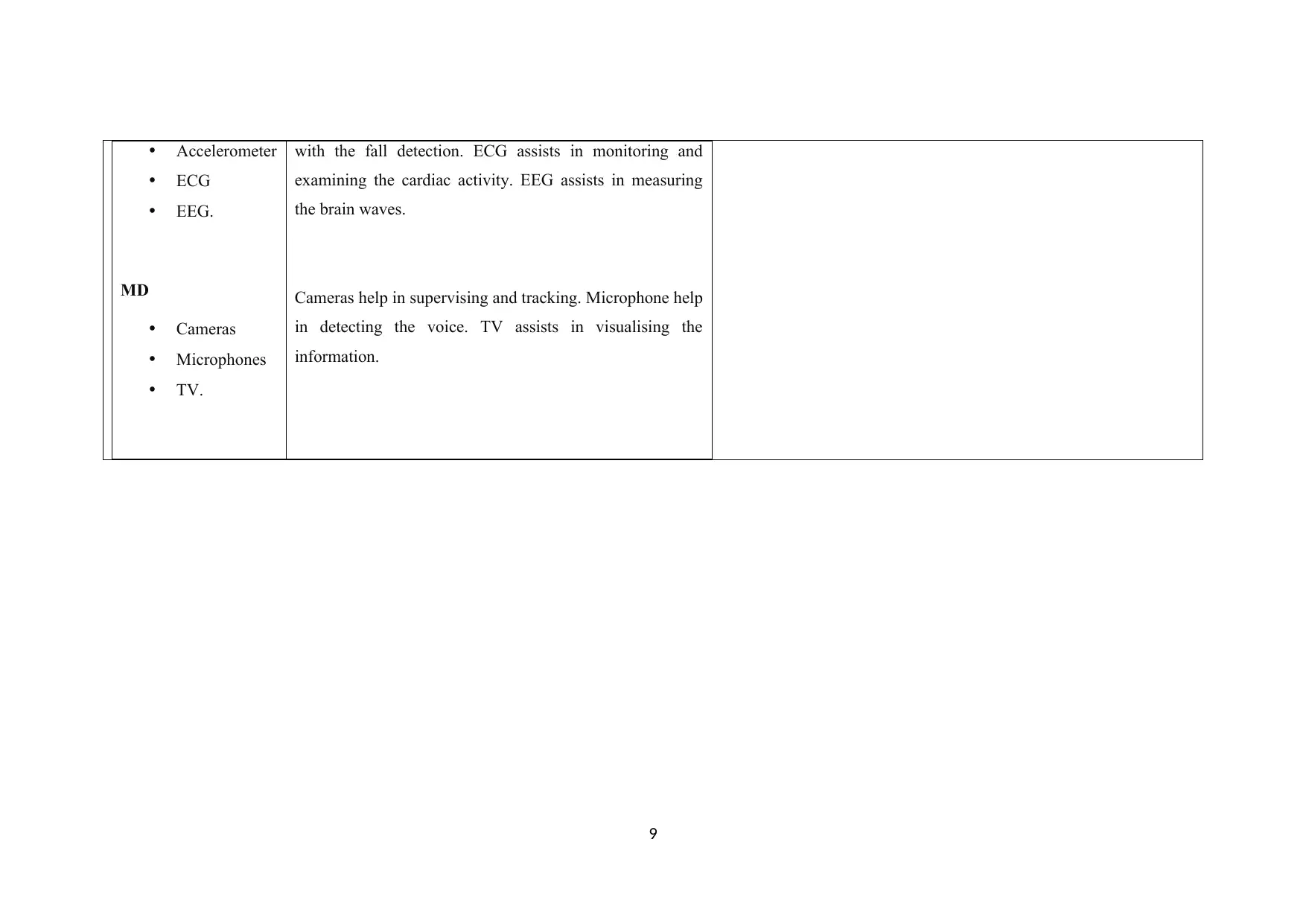
Accelerometer
ECG
EEG.
MD
Cameras
Microphones
TV.
with the fall detection. ECG assists in monitoring and
examining the cardiac activity. EEG assists in measuring
the brain waves.
Cameras help in supervising and tracking. Microphone help
in detecting the voice. TV assists in visualising the
information.
9
ECG
EEG.
MD
Cameras
Microphones
TV.
with the fall detection. ECG assists in monitoring and
examining the cardiac activity. EEG assists in measuring
the brain waves.
Cameras help in supervising and tracking. Microphone help
in detecting the voice. TV assists in visualising the
information.
9
⊘ This is a preview!⊘
Do you want full access?
Subscribe today to unlock all pages.

Trusted by 1+ million students worldwide
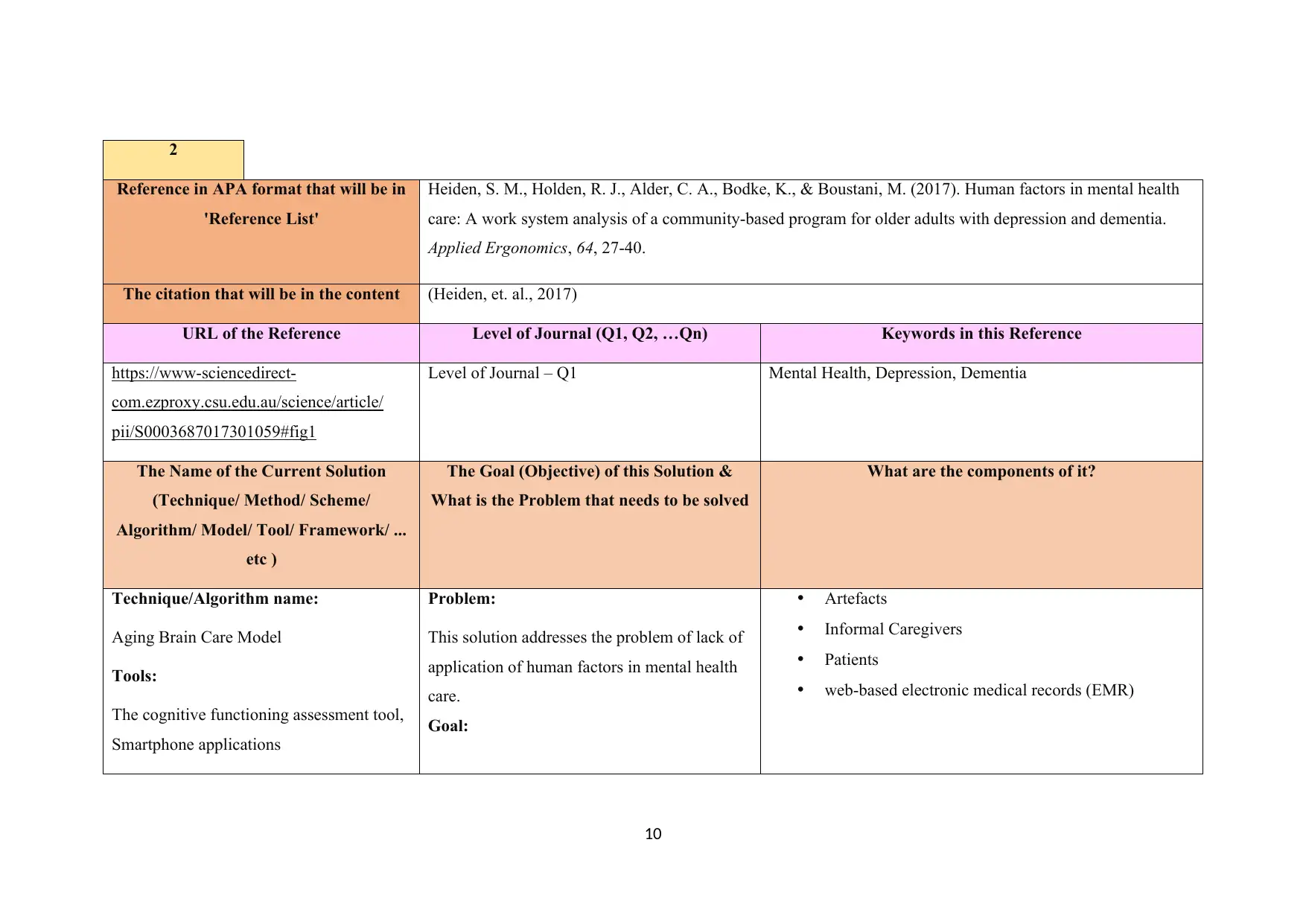
2
Reference in APA format that will be in
'Reference List'
Heiden, S. M., Holden, R. J., Alder, C. A., Bodke, K., & Boustani, M. (2017). Human factors in mental health
care: A work system analysis of a community-based program for older adults with depression and dementia.
Applied Ergonomics, 64, 27-40.
The citation that will be in the content (Heiden, et. al., 2017)
URL of the Reference Level of Journal (Q1, Q2, …Qn) Keywords in this Reference
https://www-sciencedirect-
com.ezproxy.csu.edu.au/science/article/
pii/S0003687017301059#fig1
Level of Journal – Q1 Mental Health, Depression, Dementia
The Name of the Current Solution
(Technique/ Method/ Scheme/
Algorithm/ Model/ Tool/ Framework/ ...
etc )
The Goal (Objective) of this Solution &
What is the Problem that needs to be solved
What are the components of it?
Technique/Algorithm name:
Aging Brain Care Model
Tools:
The cognitive functioning assessment tool,
Smartphone applications
Problem:
This solution addresses the problem of lack of
application of human factors in mental health
care.
Goal:
Artefacts
Informal Caregivers
Patients
web-based electronic medical records (EMR)
10
Reference in APA format that will be in
'Reference List'
Heiden, S. M., Holden, R. J., Alder, C. A., Bodke, K., & Boustani, M. (2017). Human factors in mental health
care: A work system analysis of a community-based program for older adults with depression and dementia.
Applied Ergonomics, 64, 27-40.
The citation that will be in the content (Heiden, et. al., 2017)
URL of the Reference Level of Journal (Q1, Q2, …Qn) Keywords in this Reference
https://www-sciencedirect-
com.ezproxy.csu.edu.au/science/article/
pii/S0003687017301059#fig1
Level of Journal – Q1 Mental Health, Depression, Dementia
The Name of the Current Solution
(Technique/ Method/ Scheme/
Algorithm/ Model/ Tool/ Framework/ ...
etc )
The Goal (Objective) of this Solution &
What is the Problem that needs to be solved
What are the components of it?
Technique/Algorithm name:
Aging Brain Care Model
Tools:
The cognitive functioning assessment tool,
Smartphone applications
Problem:
This solution addresses the problem of lack of
application of human factors in mental health
care.
Goal:
Artefacts
Informal Caregivers
Patients
web-based electronic medical records (EMR)
10
Paraphrase This Document
Need a fresh take? Get an instant paraphrase of this document with our AI Paraphraser
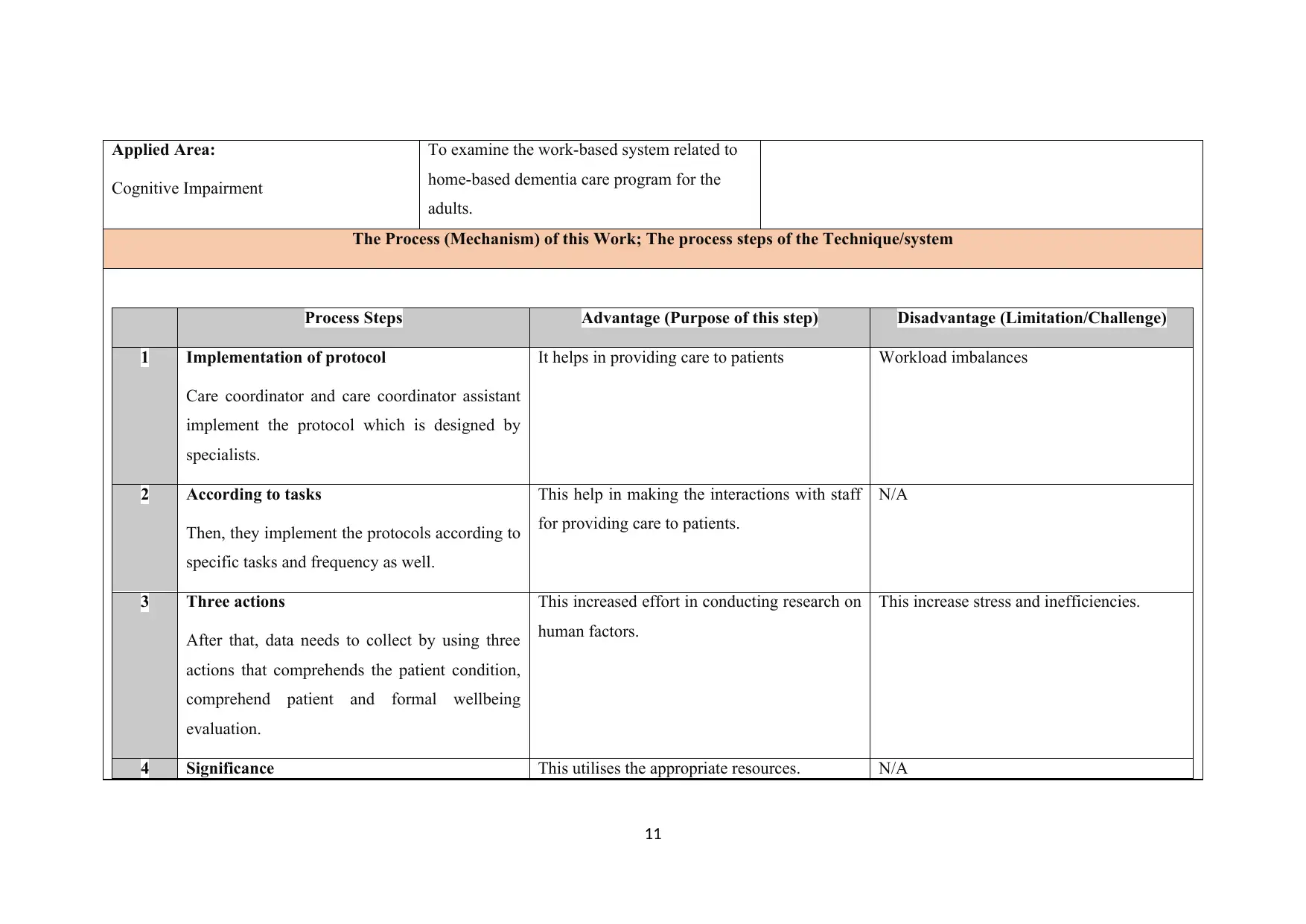
Applied Area:
Cognitive Impairment
To examine the work-based system related to
home-based dementia care program for the
adults.
The Process (Mechanism) of this Work; The process steps of the Technique/system
Process Steps Advantage (Purpose of this step) Disadvantage (Limitation/Challenge)
1 Implementation of protocol
Care coordinator and care coordinator assistant
implement the protocol which is designed by
specialists.
It helps in providing care to patients Workload imbalances
2 According to tasks
Then, they implement the protocols according to
specific tasks and frequency as well.
This help in making the interactions with staff
for providing care to patients.
N/A
3 Three actions
After that, data needs to collect by using three
actions that comprehends the patient condition,
comprehend patient and formal wellbeing
evaluation.
This increased effort in conducting research on
human factors.
This increase stress and inefficiencies.
4 Significance This utilises the appropriate resources. N/A
11
Cognitive Impairment
To examine the work-based system related to
home-based dementia care program for the
adults.
The Process (Mechanism) of this Work; The process steps of the Technique/system
Process Steps Advantage (Purpose of this step) Disadvantage (Limitation/Challenge)
1 Implementation of protocol
Care coordinator and care coordinator assistant
implement the protocol which is designed by
specialists.
It helps in providing care to patients Workload imbalances
2 According to tasks
Then, they implement the protocols according to
specific tasks and frequency as well.
This help in making the interactions with staff
for providing care to patients.
N/A
3 Three actions
After that, data needs to collect by using three
actions that comprehends the patient condition,
comprehend patient and formal wellbeing
evaluation.
This increased effort in conducting research on
human factors.
This increase stress and inefficiencies.
4 Significance This utilises the appropriate resources. N/A
11
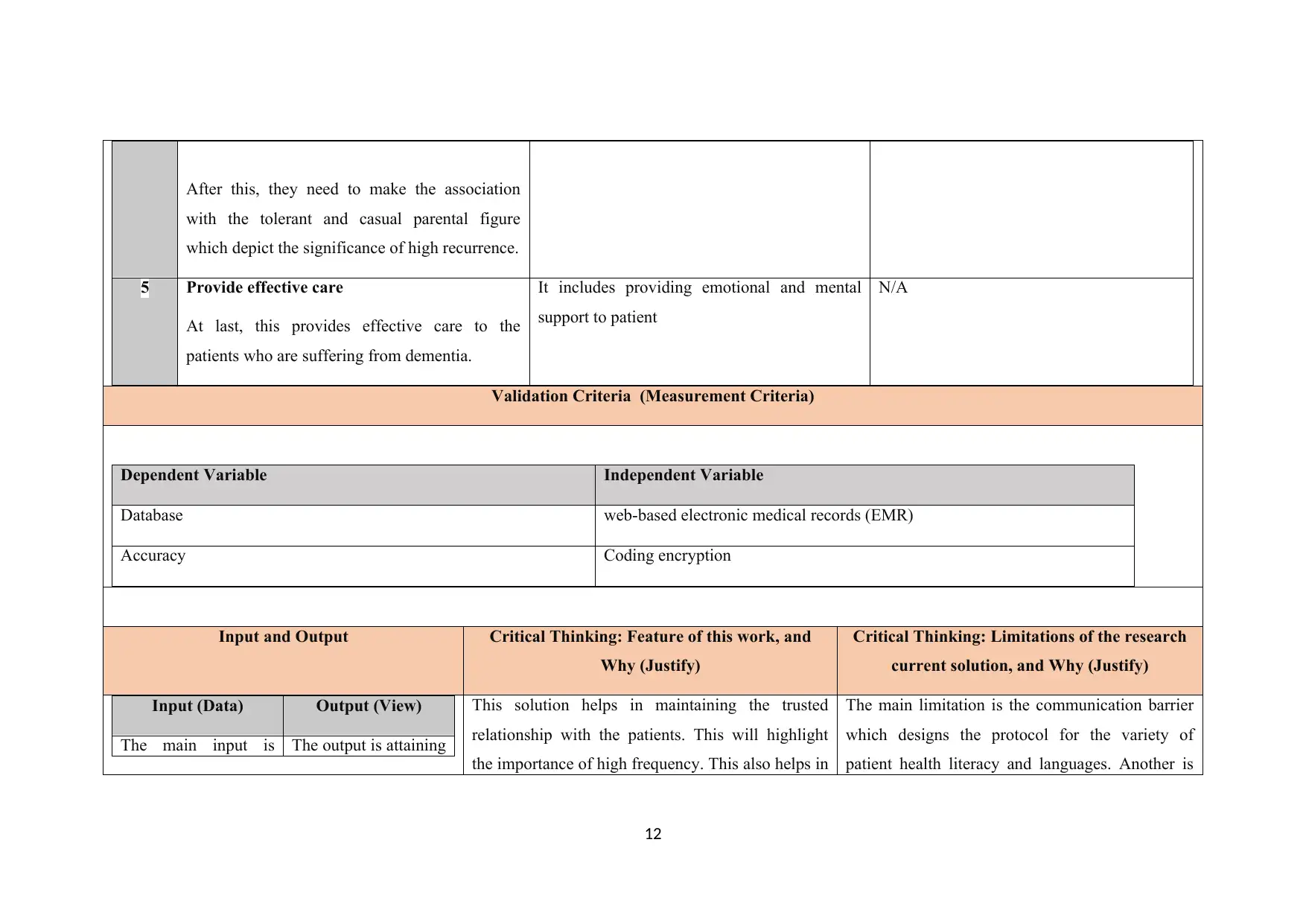
After this, they need to make the association
with the tolerant and casual parental figure
which depict the significance of high recurrence.
5 Provide effective care
At last, this provides effective care to the
patients who are suffering from dementia.
It includes providing emotional and mental
support to patient
N/A
Validation Criteria (Measurement Criteria)
Dependent Variable Independent Variable
Database web-based electronic medical records (EMR)
Accuracy Coding encryption
Input and Output Critical Thinking: Feature of this work, and
Why (Justify)
Critical Thinking: Limitations of the research
current solution, and Why (Justify)
Input (Data) Output (View)
The main input is The output is attaining
This solution helps in maintaining the trusted
relationship with the patients. This will highlight
the importance of high frequency. This also helps in
The main limitation is the communication barrier
which designs the protocol for the variety of
patient health literacy and languages. Another is
12
with the tolerant and casual parental figure
which depict the significance of high recurrence.
5 Provide effective care
At last, this provides effective care to the
patients who are suffering from dementia.
It includes providing emotional and mental
support to patient
N/A
Validation Criteria (Measurement Criteria)
Dependent Variable Independent Variable
Database web-based electronic medical records (EMR)
Accuracy Coding encryption
Input and Output Critical Thinking: Feature of this work, and
Why (Justify)
Critical Thinking: Limitations of the research
current solution, and Why (Justify)
Input (Data) Output (View)
The main input is The output is attaining
This solution helps in maintaining the trusted
relationship with the patients. This will highlight
the importance of high frequency. This also helps in
The main limitation is the communication barrier
which designs the protocol for the variety of
patient health literacy and languages. Another is
12
⊘ This is a preview!⊘
Do you want full access?
Subscribe today to unlock all pages.

Trusted by 1+ million students worldwide
1 out of 115
Related Documents
Your All-in-One AI-Powered Toolkit for Academic Success.
+13062052269
info@desklib.com
Available 24*7 on WhatsApp / Email
![[object Object]](/_next/static/media/star-bottom.7253800d.svg)
Unlock your academic potential
Copyright © 2020–2026 A2Z Services. All Rights Reserved. Developed and managed by ZUCOL.




